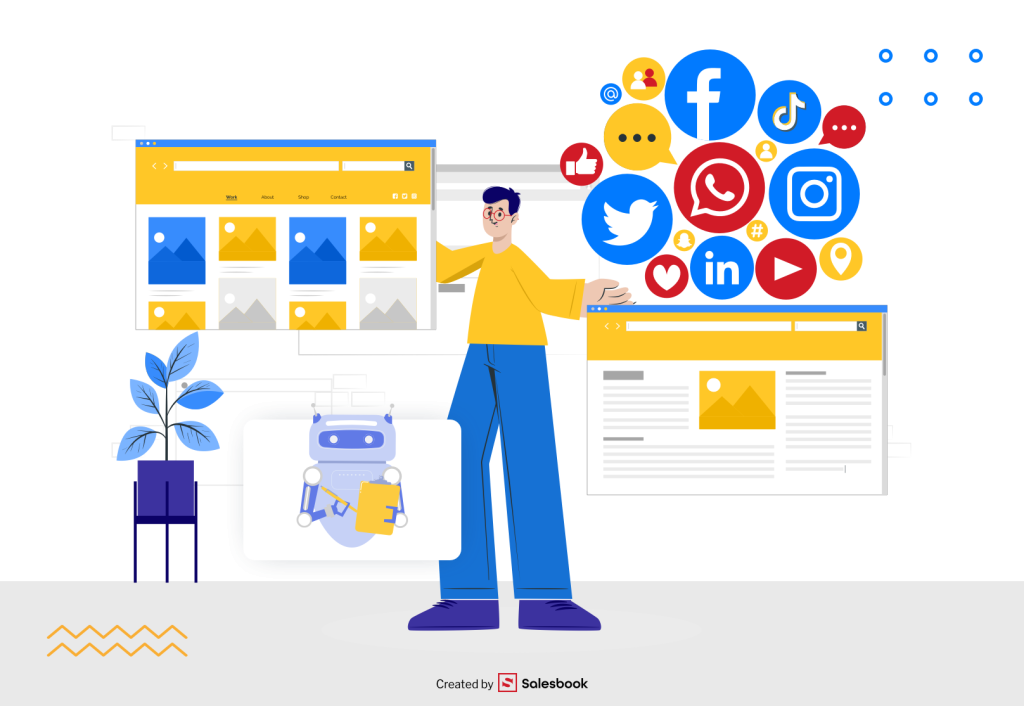AI in Sales: How Artificial Intelligence is Transforming Sales Processes

Just a few years ago, implementing AI in sales seemed like a futuristic idea reserved for the biggest corporations. Today, AI-driven solutions are available to companies of all sizes – from startups to large B2B organizations. They are used not only for data analysis but also for lead generation, offer personalization, predicting buying decisions, and supporting sales teams in customer service.
Most importantly, AI is not some abstract technology – it’s a set of practical tools that help salespeople in their daily work. Teams that adopt these solutions gain faster access to insights, can better tailor communication to prospects, and run more effective sales activities. The result? More successful sales meetings, deeper market understanding, and a lasting competitive advantage.
What is AI in Sales and Why Is It a Game-Changer?
AI in sales refers to applying artificial intelligence algorithms and systems throughout the sales process – from the very first contact with a potential customer to closing the deal and post-sale support. Modern AI sales tools are designed to analyze customer data in real time, optimize marketing strategies, support sales forecasting, and even suggest the best next step for sales professionals during crucial sales calls and meetings.
According to a McKinsey report, companies using AI in sales can boost their sales team efficiency by up to 50% thanks to smarter pipeline management and activity prioritization (McKinsey, 2021). For sales leaders, this means more accurate planning, reduced reliance on manual data entry, and faster decision-making.
In practice, this shift has transformed everyday work. Instead of spending hours manually qualifying leads, sales professionals now rely on intelligent sales tools and advanced analytics to quickly evaluate customer interactions, assess contact quality, and predict purchase potential. The outcome is not only improved sales performance but also a more scalable, data-driven approach to managing opportunities and building long-term relationships.
Definition and Practical Use Cases of AI Sales Tools
Put simply, AI in sales is the use of advanced technologies to support and automate tasks that were once done manually. The most common applications include:
- Lead generation – algorithms scan data from multiple sources to identify contacts with the highest purchase potential.
- Personalized communication – AI analyzes customer behavior and history to create tailored offers that meet individual needs.
- AI-powered CRM systems – assist sales reps by suggesting the best time to reach out or recommending the next step in the sales funnel.
- Sales conversation analysis – transcription and analytics tools help managers understand which techniques are most effective.
- Follow-up automation – AI sends reminders, messages, or meeting requests at the right moment, increasing the chances of conversion.
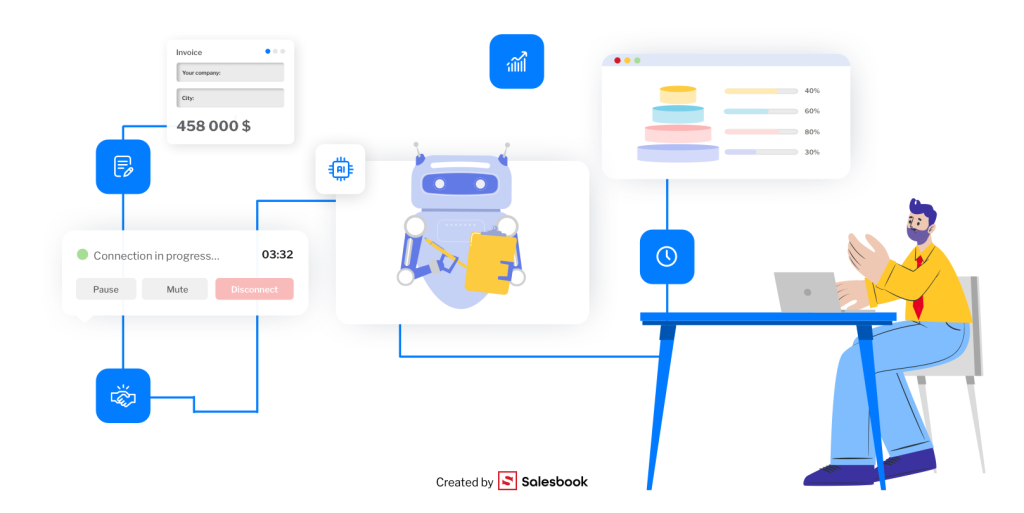
AI in Sales vs. Traditional Tools – Key Differences
The traditional sales model relied heavily on the salesperson’s experience and manual work in the CRM system. Every customer interaction required separate analysis, and access to data was limited. AI in sales changes this perspective:
- Customer data is analyzed automatically and presented in real time, shortening the decision-making process.
- Salespeople receive ready-made recommendations instead of planning every step on their own.
- Instead of one-size-fits-all communication, personalization makes it possible to tailor offers to each customer’s profile.
- Teams can reach a broad audience while maintaining high-quality interactions.
As a result, sales reps not only save time but also unlock the full potential of data and gain a faster competitive edge.
How Does AI Support Building an Effective Sales Strategy?
Every effective sales strategy starts with sales data. Salespeople may know their market and assess prospects intuitively, but it’s only the combination of their expertise with modern AI tools and sales AI capabilities that makes the process more predictable, measurable, and scalable. This is especially true in B2B sales, where the number of customer interactions and channels increases every year, and customer behavior becomes harder to interpret without advanced analytics.
Modern AI tools do more than automate repetitive tasks—they empower sales operations with data-driven insights, advanced lead scoring, and even real-time analysis of crm data. By leveraging lead scoring models enriched with historical data, sales teams can quickly prioritize opportunities, identify high-value prospects, and allocate resources more effectively.
In addition, AI-driven lead scoring systems help interpret customer sentiment during campaigns and provide actionable recommendations for next steps. While salespeople focus on building relationships, intelligent ai agents support them in the background, streamlining workflows and ensuring consistency across all communication channels.
The result is higher efficiency, smarter decisions, and a sales strategy that scales seamlessly while maintaining accuracy and personalization.
Data as the Foundation of a Sales Strategy
A well-designed sales strategy doesn’t rely on intuition but on facts. AI can analyze millions of data points in real time – from social media activity and buying behaviors to historical CRM records. This allows sales managers to quickly identify customer needs, pinpoint the most promising leads, and allocate resources where they create the most value.
Crucially, data analysis not only helps companies understand the market better but also design personalized offers that increase team effectiveness. Research by Salesforce shows that companies using AI in sales data analysis achieve on average 15% higher team productivity (Salesforce, 2023).
Combining Team Expertise with AI
Technology alone cannot replace the knowledge of salespeople. AI provides powerful support, but it’s the human experience and skills that make the sales process successful. That’s why the best organizations focus on synergy – AI handles the heavy lifting of analysis and automation, while sales teams focus on what matters most: building relationships and understanding the customer’s business context.
In practice, a CRM system collects data from multiple sources, and AI tools help interpret it and suggest next steps. A salesperson receives actionable recommendations – such as the best time to reach out or which offer fits the customer’s individual needs.
This transforms the quality of the sales process. Companies achieve higher efficiency, plan actions more effectively, and make their strategies flexible and scalable. Case studies across the B2B sector show that combining team expertise with AI capabilities not only improves financial results but also strengthens long-term customer relationships.
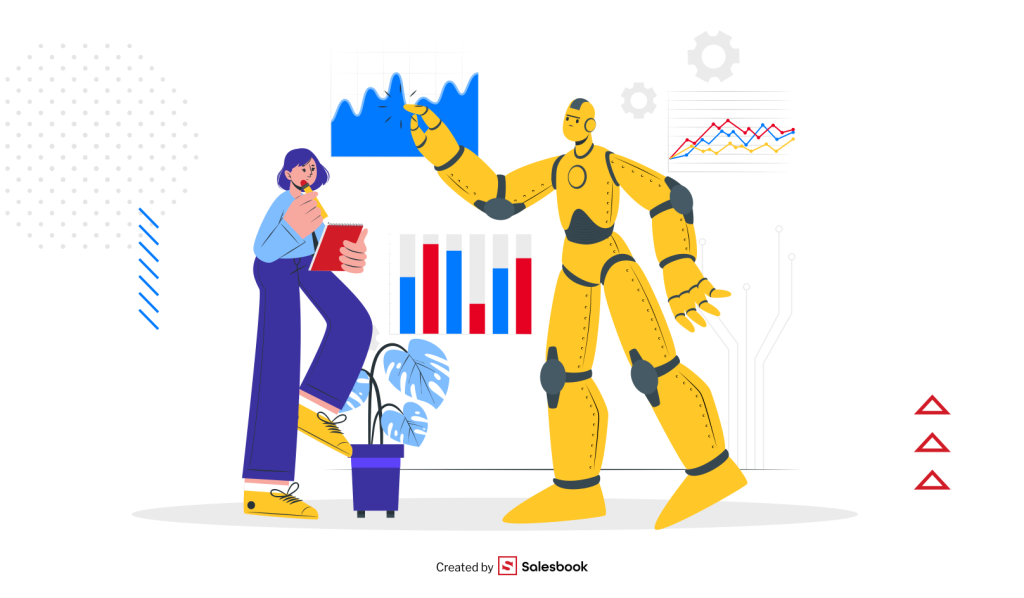
AI in B2B Sales – New Opportunities and Challenges
AI in B2B sales is no longer a novelty but a standard for sales organizations seeking to improve efficiency, drive sales growth, and respond more precisely to business client needs. Today, AI sales solutions not only accelerate analyzing customer data but also enable large-scale personalization and deeper customer engagement across channels.
According to a McKinsey report, as many as 90% of B2B sales leaders believe AI will be a key part of their strategy within the next 3–5 years. This shift reflects the complexity of the B2B sales cycle, which requires multiple interactions, negotiations, document reviews, and decisions based on large volumes of historical sales data and market trends.
By integrating sales AI tools with customer relationship management platforms and even modern sales cloud solutions, companies are making the entire sales cycle more predictable, data-driven, and less prone to human error. Techniques such as predictive analytics, machine learning, and conversation intelligence help sales teams identify buying signals earlier, optimize sales engagement, and reduce time wasted on repetitive tasks or other repetitive sales tasks.
At the same time, innovations like generative AI and advanced ai sales systems are reshaping how artificial intelligence is changing sales—providing real-time recommendations, drafting personalized proposals, and continuously learning from past performance. The result is a powerful framework where AI not only supports efficiency but also enables sales organizations to scale operations and unlock new growth opportunities.
Process Automation in B2B Sales
One of the biggest challenges in B2B sales is managing the long sales cycle. Here, AI brings real value by automating processes such as:
- analyzing data from multiple sources to identify the most promising leads,
- recommending next steps in the sales process,
- personalizing offers based on the client’s industry and needs,
- sending automatic reminders and follow-up actions that increase overall effectiveness.
With AI, companies can cut lead qualification time by up to 50% (Salesforce, 2023). This is a huge leap in efficiency, especially in industries where inquiry volumes are high and purchasing decisions can take months.
AI also enables continuous monitoring of sales processes, allowing managers to react quickly and manage the pipeline more effectively. The result is not only time savings but also better alignment of sales activities with market expectations.
Impact on Business Client Relationships
In B2B, every sale is more than just a transaction – it’s the start of a long-term partnership. That’s why AI must go beyond automated responses. Its greatest strength lies in supporting the relationship between salespeople and their business clients.
With AI technologies, sales reps gain access to a more complete view of the customer: purchase history, multi-channel interactions, and responses to previous campaigns. This knowledge allows for deeper personalization and more context-driven communication.
What’s more, AI relieves salespeople of repetitive tasks, giving them time to focus on soft skills – negotiation, advisory, and building trust. This balance between process automation and human connection enables B2B organizations to achieve higher effectiveness while fostering long-term relationships with key clients.

AI in Lead Generation
Acquiring potential customers is the foundation of every sales team. The challenge is that traditional methods—cold calls, mass emails, or manual research—are time-consuming and often ineffective. This is where AI in sales proves transformative, as modern AI technology and advanced ai sales tools can analyze thousands of online signals to identify individuals or companies with genuine purchase potential.
Instead of relying solely on outdated sales tools, today’s sales professionals and sales representatives can use sales artificial intelligence to automate the identification of prospects and focus on high value activities such as relationship-building and closing deals. Techniques like predictive lead scoring and ai driven insights ensure that only the most promising contacts are passed to the sales team, dramatically improving sales performance and overall sales efficiency.
Modern ai technology also supports sales forecasting by analyzing patterns in behavior and historical interactions, giving sales professionals visibility into key moments when prospects are most likely to convert. Combined with generative AI, teams can automatically generate personalized messages tailored to each lead’s context, ensuring stronger engagement and a smoother path to closing deals.
For sales leaders, this shift in artificial intelligence changing sales means higher sales productivity, better prioritization, and scalable prospecting strategies. With sales intelligence platforms and sales coaching supported by ai for sales, organizations empower every sales team member to work smarter, not harder—making the entire lead generation process faster, more accurate, and far more impactful.
Intelligent Algorithms and Lead Generation
AI-powered lead generation relies on technologies that, just a few years ago, were available only to the largest players:
- Web scraping + NLP – automatically scanning websites, listings, and social media for contact details and buying signals.
- Intent data platforms – systems that identify behaviors indicating purchase intent (e.g., frequent visits to product pages, downloading whitepapers).
- CRM integration – leads flow directly into the database in real time, with AI instantly assessing their potential.
- AI chatbots – not only collecting data but also pre-qualifying leads through short interactions.
Pro tip: Configure AI to generate personalized offers for selected segments right away. This shortens the time from identifying a lead to the salesperson’s first outreach.
Purchase Prediction and Lead Scoring
Capturing a lead is just the beginning. The real challenge is determining whether that lead is worth pursuing. This is where AI-powered prediction and scoring prove invaluable:
- AI lead scoring – algorithms evaluate leads based on online behavior, marketing campaign activity, and CRM data.
- Predictive analytics – models forecast which prospects are closest to making a purchase by analyzing historical behavior patterns.
- Follow-up automation – systems send reminders, schedule meetings, or generate suggestions for the next step in the process.
- Hyper-personalization – AI tailors communication to the client’s style and context, improving the effectiveness of first contact.
Pro tip: Set up rules to automatically filter out low-quality leads. This way, sales teams focus exclusively on high-potential contacts, significantly boosting overall efficiency.
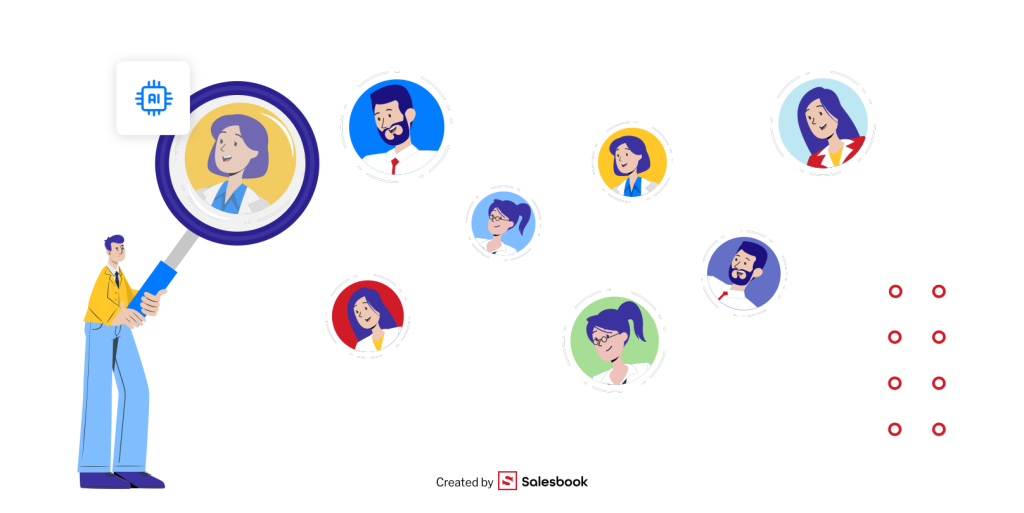
From Conversation to Decision – Analyzing Sales Calls with AI
Every sales conversation hides more insights than it seems at first glance. Tone of voice, length of responses, choice of words – all of these are signals that can determine the outcome of a meeting. With AI in sales, these signals can be captured, analyzed, and leveraged to improve the quality of the entire sales process.
How Artificial Intelligence Helps Understand Customer Intent
AI-powered conversation analysis goes far beyond a salesperson’s notes. Systems using natural language processing (NLP) can:
- identify key phrases that signal buying intent, such as questions about budget or timelines,
- detect emotions in voice or text – from hesitation and frustration to genuine excitement,
- map full conversation paths and compare them with best practices inside the company,
- highlight moments when the customer raises objections or signals a need for more information.
Pro tip: By integrating analytics with your CRM, you can tag specific parts of conversations as “buying signals” and automatically assign follow-ups to the right salesperson. This significantly shortens response time and increases the likelihood of conversion.
AI in Evaluating Sales Call Quality
Conversation analysis isn’t only about understanding customers better – it’s also a powerful tool for developing your sales team. AI can act as a coach, objectively evaluating interactions by:
- comparing conversations across sales reps, highlighting strengths and weaknesses,
- analyzing speaking ratios – how much the salesperson talks versus the client (the ideal balance is around 40/60),
- detecting interruptions, awkward silences, or overly long presentations,
- suggesting ways to ask better questions and build stronger relationships.
Pro tip: Create a library of “best practice” conversations to use as training resources. This helps new team members quickly adopt the techniques that consistently lead to closed deals.

Automating Follow-Ups – How AI Increases Conversion
Follow-ups are the stage where most salespeople lose patience and many customers lose interest. The problem is that manually tracking deadlines and crafting messages is time-consuming and prone to error. AI in sales transforms this process into something predictable and automated, allowing teams to maintain consistent communication without becoming overloaded.
Automated follow-ups mean that the system not only reminds reps when it’s time to reach out but also creates and sends messages at the right moment. This makes sales activities more consistent while minimizing the risk of missed opportunities.
Personalizing Messages with Artificial Intelligence
The golden rule of follow-ups: the message must feel personalized enough so that the customer doesn’t dismiss it as “just another automated email.” AI supports personalization in several ways:
- analyzing the history of interactions and tailoring content to past conversations,
- adjusting tone and style depending on the client – communicating differently with a startup than with a large corporation,
- suggesting the best time to send based on prior engagement patterns,
- recommending personalized offers that increase the chance of conversion.
Pro tip: Set CRM rules to automatically generate a draft follow-up after every meeting. The salesperson only needs to approve and hit “send.” This saves time and boosts efficiency.
Monitoring Reactions and Optimizing Communication
Sending messages is just the first step. The real power of AI in sales appears when the system tracks customer responses:
- checking which emails were opened and how much time the recipient spent reading,
- analyzing which links were clicked,
- comparing the effectiveness of different message variants through A/B testing,
- recommending the best next steps in communication.
As a result, follow-ups are no longer random. They become a process that learns from every interaction and improves over time.
Pro tip: Use AI to segment customers and assign them to tailored follow-up scenarios. This ensures every group receives messages best aligned with their individual needs.
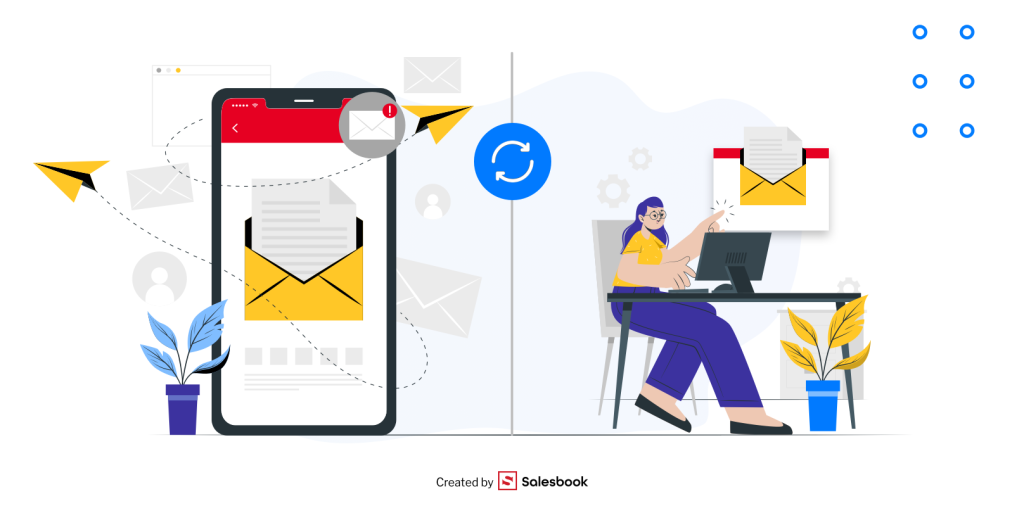
AI and the Future of Customer Service and Sales
The future of AI in sales is not just about tools that support sales reps—it’s about creating an entire ecosystem that integrates customer service, marketing, and sales processes into one seamless system. More and more organizations are building strategies where AI is responsible not only for lead generation but also for maintaining customer satisfaction at every stage of the buyer’s journey.
Automation, Self-Service, and Sales Team Support
In practice, the future lies in hybrid models where automation and self-service go hand in hand with human sales support:
- Self-service portals – customers can solve simple issues themselves (e.g., updating data, checking order status), reducing the workload on teams.
- Automated ticketing systems – customer inquiries are instantly classified and routed to the right person.
- AI assistants – support sales reps in daily tasks by suggesting the best offers or preparing meeting notes.
This gives salespeople more time to focus on relationship-building and strategic conversations instead of repetitive tasks.
Pro tip: Set up CRM workflows that combine AI with human involvement—for example, a customer starts with self-service but can switch to a live agent at any time.
How AI Minimizes Errors and Shortens Response Time
One of AI’s greatest strengths in sales and customer service is reducing errors caused by haste or oversight. AI-powered systems can:
- validate data entry to prevent mistakes,
- monitor deadlines and send reminders so no inquiry gets overlooked,
- analyze message content and instantly suggest ready-to-use responses,
- operate in real time, dramatically shortening response times.
For customers, this means quick and consistent answers. For sales teams, it translates into greater efficiency and less stress from manually tracking details.
Pro tip: When implementing AI, don’t stop at communication automation. Ensure the system also analyzes service quality metrics—such as customer satisfaction scores—and reports them continuously.
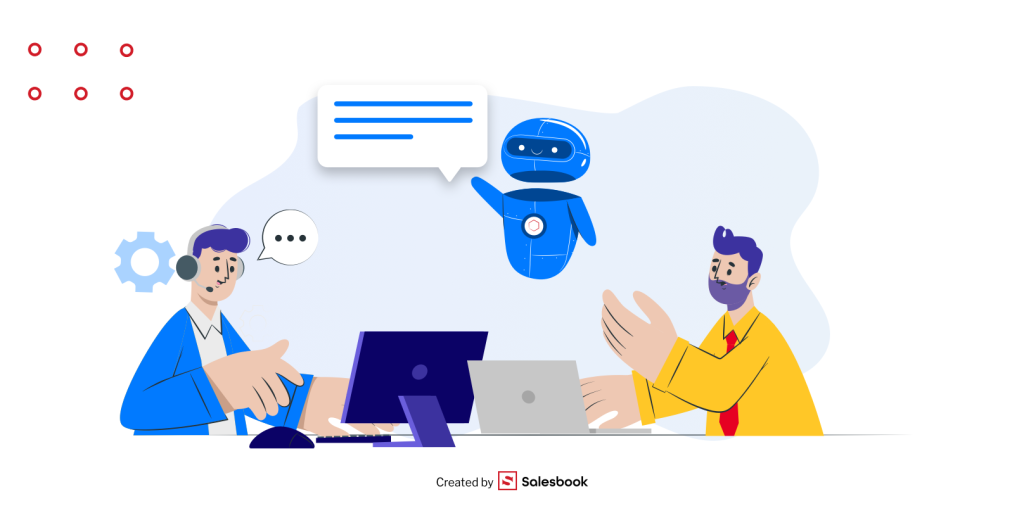
Conclusion – AI in Sales as the Key to Scaling Business
AI in sales is no longer a futuristic buzzword but a practical tool supporting companies in their daily operations. From lead generation and conversation analysis to automated follow-ups and self-service development—artificial intelligence is transforming every stage of the sales process, enabling organizations to operate faster, more precisely, and more effectively.
The true value of AI, however, isn’t the technology itself but how it empowers people. With AI, sales reps gain more time for what really matters: strategic conversations, relationship building, and adapting solutions to their clients’ business context. AI for salespeople isn’t competition—it’s a partner that eliminates errors, organizes data, and delivers real-time recommendations.
Companies that adopt AI thoughtfully—with a well-configured CRM, a tailored strategy, and clear goals—will gain a faster competitive edge. These are the organizations capable of scaling sales processes, improving performance, and delivering personalized offers not just to a few clients, but across entire customer segments.
In short: AI in sales doesn’t replace people. It amplifies them and give them a key insights. And it’s in this blend of technology and human touch that the future of successful sales lies.
FAQ – Most Common Questions About AI in Sales
1. What is AI in sales?
AI in sales refers to using artificial intelligence to automate sales processes, analyze data, and support sales reps in lead generation, personalized communication, and customer service.
2. How does AI support sales reps in daily work?
AI helps by suggesting the best time to reach out, creating personalized offers, analyzing sales conversations, and automating follow-ups.
3. Does AI work equally well in B2B and B2C sales?
Yes. In B2B, AI is especially valuable—it shortens long sales cycles, boosts efficiency, and helps build lasting business relationships.
4. What are examples of AI applications in sales?
The most common include lead generation, purchase prediction and lead scoring, conversation analysis, follow-up automation, personalized communication, and self-service in customer support.
5. Does implementing AI require changing the CRM system?
Not always. Many AI tools integrate seamlessly with existing CRMs, enhancing them with real-time analytics and automation.
6. How does AI impact building customer relationships?
AI supports sales reps by taking over repetitive tasks and delivering personalization insights. This allows salespeople to focus on strategic conversations and building trust.
7. What measurable benefits does AI bring to sales?
Companies report higher sales effectiveness, faster lead generation, and improved customer satisfaction. The greatest advantage, however, is the ability to scale sales processes without sacrificing service quality.
Table of Contents






